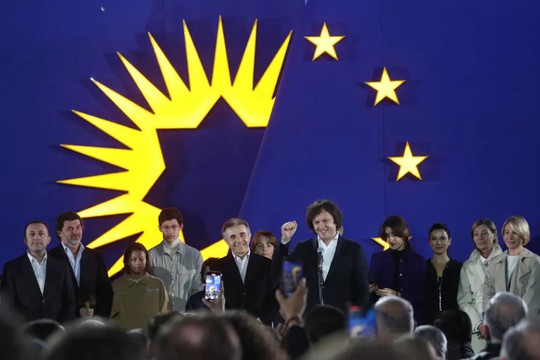Georgia’s Prime Minister, Irakli Kobakhidze, speaking at the Georgian Dream party headquarters in Tbilisi, Georgia, on Saturday.
Photo: Reuters
The ruling Georgia Dream party won a majority in the vote. The opposition, which fears the country is moving away from the West, says the voting was not fair and that it will not appear in Parliament, NYT reports. The Election Administration of Georgia, the body that oversees elections in the country, reported on Sunday that the ruling party garnered more than 54 percent of the vote with the four main opposition groups receiving 37.5 percent. That means that Georgian Dream will have 89 seats in Parliament with the remaining 61 occupied by the opposition.
For two decades, the love affair between Georgia and the West had been a passionate one. For years, that affection was warmly reciprocated in Washington, Brussels and other European capitals, where Georgia has long been a cherished partner — an inspiring example of the spread of Western values and a key strategic outpost for projecting influence deep into the post-Soviet space. But these days, the romance is on the rocks, writes ‘The New York Times’.
…The United States and the European Union are opposing Georgian Dream as openly as they can, while maintaining the thinnest veneer of impartiality.
Like going bankrupt, the collapse in relations between Georgia and the West happened gradually, then suddenly. And there’s no assurance they can be restored.
Western policymakers were initially understanding of Georgia’s neutrality. They appreciated the country’s precarious position: After all, Georgia had no security guarantee from the West, despite years of unsuccessful efforts to gain NATO membership. Even as it tried to stay neutral in the Ukraine war, Georgia applied for — and last year received — candidate status in the European Union.
But things quickly degenerated. Georgian Dream, which has been moving to the right, began promoting an elaborate conspiracy theory in which a “global war party” was pushing Georgia to enter the war against Russia on behalf of the West and Ukraine. It also claimed that the domestic opposition was in cahoots with this force.
The United States and the European Union responded forcefully. Over the past few months Washington has slapped financial sanctions and visa restrictions on dozens of Georgian officials and canceled joint military exercises. Brussels, for its part, has suspended accession talks. Relations are at an all-time low.
This comes as the war in Ukraine has given the Caucasus region a new strategic significance. Europe is trying to develop new transportation routes to Asia that bypass Russia: in an effort to break its dependence on Russian energy, the European Union is increasing its purchases of Azerbaijani gas, which moves through Georgia on its way to Europe, and financing a massive new electric cable from Georgia to Romania under the Black Sea.
Just as Europe needs Georgia more, Georgia seems to need the West less. The government recently awarded a contract to build a critical port on the Black Sea to a Chinese-led consortium, as part of China’s Belt and Road Initiative. Western officials publicly objected to awarding such a strategic project to China, but in private, diplomats acknowledge that no Western business was willing to put up the required funds.
Eight years since Georgia signed a trade agreement with the European Union, trade with Europe — to say nothing of trade with the United States — remains relatively limited and Georgia’s commerce is dominated by countries closer to its borders. Like many countries in the region, Georgia has profited economically from Russia’s isolation from Western markets, reshipping cars to Russia and hosting new businesses run by Russian émigrés.
These developments appear to have made Georgian Dream believe that instead of remaining unswervingly loyal to the West, it can be more transactional — and that Georgia’s geostrategic importance may be enough for Washington and Brussels to overlook both its growing disobedience.
But it’s undeniable that the country has more options than ever. But it’s not clear whether the United States and the European Union, in the long run, can keep Georgia from slipping out of their embrace.
read more in our Telegram-channel https://t.me/The_International_Affairs

 11:57 28.10.2024 •
11:57 28.10.2024 •























